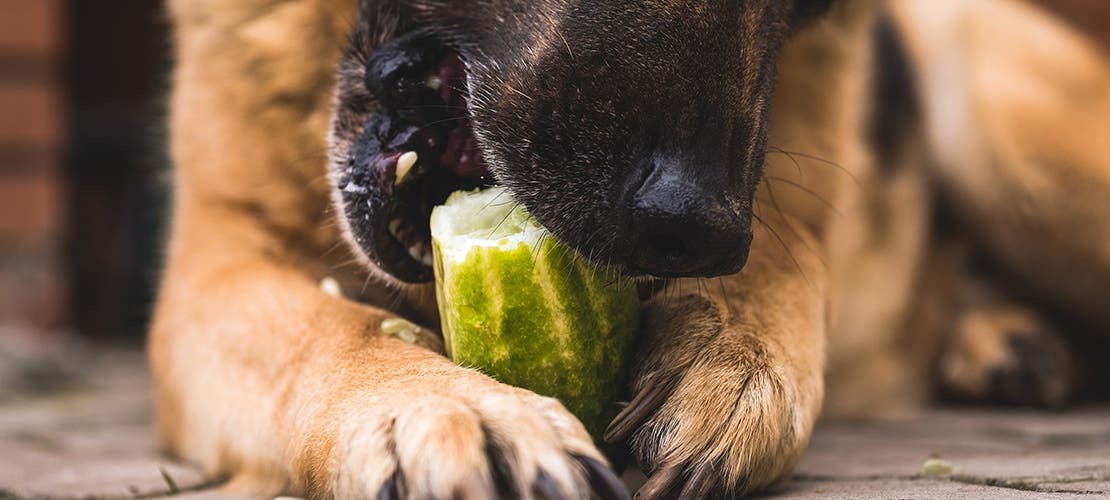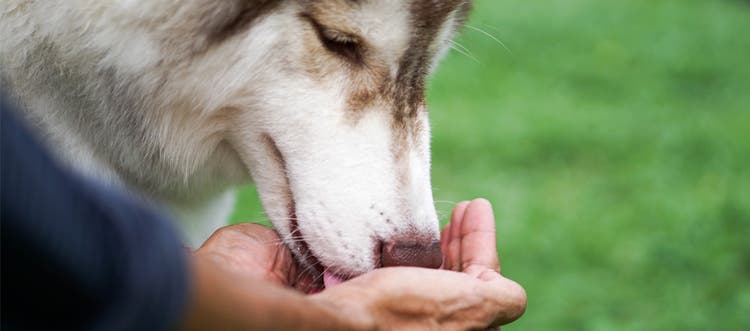What fruits to share or not share with your dog.
From our homes to our daily routines, we share a lot with our dogs, including the food on our plates. But while we know that many human foods - like chocolate and onions - aren't good for dogs, what about healthier options, like fruit?
Feeding your dog fruit is a fun way to bond with your pup and give them an occasional tasty, antioxidant-rich snack. Just keep in mind that fruit shouldn't be used as a replacement for pet weight loss food or as a way to balance their diet.
What Fruit Can Dogs Eat?
Here's what you should know about fruits your dog can safely eat, and what to avoid.
Can My Dog Eat Apples?
Yes, but with caution and proper preparation. Apples are an especially good treat for overweight or senior dogs, as they are high in fiber and low in fat. They also contain vitamins A and C. However, before giving an apple to your dog, make sure to remove the seeds, which contain trace amounts of toxic cyanide, as well as the core, which can cause irritation if eaten.
Can My Dog Eat Avocado?
No. Avocados contain a toxin called persin, which can cause death in some animals, including birds. It's mostly concentrated in the leaves, stem, skin and pit of avocados, but there are small amounts in the flesh, too. While dogs are more resistant to persin than other animals, persin can be found in all parts of the avocado and it's better not to risk it. Additionally, avocado pits could get stuck in your dog's gastrointestinal (GI) tract and cause a blockage.
Can My Dog Eat Bananas?
Yes. The potassium in bananas is good for your dog's muscles and heart, plus the fruit can be used as a makeshift pill pocket for pups who need to take medication. Bananas are high in carbohydrates and sugar, so you should only give them to your dog as an occasional treat.
Can My Dog Eat Blueberries?
Yes. Blueberries pack quite a punch for a bite-sized fruit. Filled with antioxidants, fiber and vitamin C, these berries are nutrient-rich and delicious, too. Try freezing berries for a cool treat on a hot summer day. Be careful feeding blueberries to smaller dogs, however, as they can be a choking hazard.
Can My Dog Eat Cantaloupe?
Yes. Cantaloupe contains many vitamins and minerals, including vitamins A, B and C. Just be sure to remove the skin and seeds before treating your pet.
Can My Dog Eat Cherries?
No. Cherry pits and stems contain cyanide and are a choking hazard. They can also cause bowel obstruction, making cherries potentially very dangerous for dogs. While the fruit itself is technically safe, it's not worth the risk.

Can My Dog Eat Cucumbers?
Yes. Cucumbers are mostly water, making them a low-calorie, crunchy treat.
Can My Dog Eat Mango?
Yes, but with caution. Mangoes are a great source of fiber, vitamins A and C, folate, B6, iron and a small amount of calcium, zinc and vitamin E. Make sure to peel the skin (which can be difficult to digest) and remove the seed, which can be a choking hazard.
Can My Dog Eat Oranges?
Yes, but with caution. The seeds, peel, stem and leaves of oranges contain an oil that is toxic to dogs. Oranges also contain citric acid, which can cause GI issues if fed too quickly.
Can My Dog Eat Peaches?
Yes, but with caution. As with many pitted fruits, the stem, leaves and peach pit contain cyanide. The pit is also a choking hazard, so only feed your pet the peach flesh.
Can My Dog Eat Pears?
Yes, but with caution. Pears contain fiber and vitamins C and A, but always remove the seeds first, as they contain traces of cyanide.
Can My Dog Eat Pineapple?
Yes. Pineapples are filled with a variety of vitamins and minerals, making them a wonderful treat for your dog. But they are also sugary, so only give it in moderation. Make sure to remove the spiky skin and hard core beforehand.
Can My Dog Eat Strawberries?
Yes. Just as good frozen as they are fresh, strawberries are a great treat for humans and dogs alike. Cut off the stem, as you would for yourself, before feeding to your pup.
Can My Dog Eat Watermelon?
Yes. Watermelon is a great source of hydration, and the seeds aren't toxic. However, you should remove the seeds and rind before giving it to your pup to help avoid GI tract irritation.
As with any new food, be sure to limit the amount of fruit you give your dog in one sitting to avoid upsetting their stomach.








